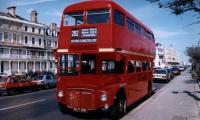Battling with the imperial old guard
- Metric Tags:
He states that the metric system is not yet the standard of measurement in Worthing and that the majority of your readers can't immediately visualise what 20cm means.
This is a topic which I have studied a great deal but I shall restrict myself here to two comments.
Firstly, we live in a world that is virtually 100 per cent metric.
Everything in the modern world, except the fabric of buildings over about 40 years old, has been designed and manufactured in metric units.
This includes all motor vehicles, all buildings and their interiors, decoration, furniture, clothing, paving and all things electrical.
In fact, electrical measurements have always been metric.
He must also switch off everything electrical (including his central heating pump).
I wish him well.
Secondly, when he and I were at school (I am 61 and I am guessing he is of a similar age) we were taught imperial units and we saw them being used.
We learnt about hundredweights and the coalman delivered coal in hundredweight bags.
We learnt about stones, pounds and ounces, and bags of flour were sold in stones and virtually everything else that was weighed was sold in pounds and ounces.
What we learned in school was relevant to what we saw in the outside world.
Today, our children are utterly confused because certain elements of our society refuse to give up their imperial units.
Children learn about metres in school, but see estate agents still using feet and inches and square feet for office space.
Children learn about kilograms and grams, but see most adults giving their body weights in stones and pound – units which are now all but extinct.
And then, of course, there's the road signs.
If people think we have been the laughing stock of Europe because of our reaction to the recent snow, they should see what the rest of Europe thinks about us and our imperial road signs.
Although we live in a virtually 100 per cent metric world, the units that children see written down or spoken are often given in imperial measurements.
Our reaction to this, of course, is to blame our children for not taking an interest in mathematics, when the blame rests firmly on the shoulders of people like Mr Garnett for hanging on to a system which is now redundant and confusing to our young people.
I taught mathematics for 31 years between 1969 and 2000 (most of that time in Worthing, incidentally) and never once taught imperial units.
Every year over 600,000 UK young people leave school and go out into the "real" world – that's over 24 million since I began teaching, many of them having little idea about the use of measurement in the modern world.
And this applies not just to people at the lower end of the mathematical ability range; I know a couple of accountants who tell me they were totally confused by measurement when they left school for the reasons I have just stated.
I have no doubt that Mr Garnett can give me a hundred "reasons" why we should stick to imperial measurements.
I have heard them all many times before – every one of them a red herring.
These red herrings, even when totalled up, do not begin to outweigh the overriding needs of our young people who are, when all is said and done, the future of our country.
Alan Young
Moat Way
Worthing
source: http://www.worthingherald.co.uk/worthing-letters/Battling-with-the-imperial-old.4997677.jp
